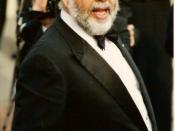Auteurism: A Disease of Greatness.
The term Auteur seems to bless a privileged group of filmmakers with an almost messiah-like legacy. Men such as Alfred Hitchcock, John Ford and Fritz Lange are believed to inhabit the ranks of the cinematic elite, and not surprisingly most critics are more than willing to bestow upon them the title of Auteur. By regarding filmmaking as yet another form of art, Auteur theory stipulates that a film is the direct result of its director's genius. With the emerging prominence of auteur based criticism in the 1950?s, the role of the director became increasingly integral to a film's success. However most would argue that this form of criticism didn't reach its apex until 1960s, when Andrew Sarris released his seminal works "Notes on the Auteur Theory" (1962) and "The American Cinema" (1968). With this book, Sarris further elaborated on Truffault's theory that "There are no good and bad movies, only good and bad directors"1.
To abuse a cliché,Sarris assumed that films are a director's canvas, and only they have the ability to create a great work of art. As intriguing as this notion might seem, there is no doubt that auteur theory is an example of oversimplification at its finest. Unlike many other forms of art, Cinema is the direct result of the cooperative effort of hundreds of people, of which the director and cast are merely the most prominent. To subscribe to auteur theory is to ignore 95% of what makes the production of a film possible, while also adhering to a set of criteria which merely accepts a specific definition of greatness. Auteurism may quite possibly be as much a stigma as a blessing because it celebrates those who adhere to a consistent style, while ignoring those who constantly reinvent themselves.
To its credit, Auteur Theory did help to spawn, what has come to be defined as "The Film Generation", an audience of mostly college age viewers who had began to view cinema as art rather than entertainment. However, in its quest to define a canon of excellence, auteur theory often helped to neglect the merits of film which functioned as popular entertainment. At what point does art end and popular entertainment begin? During the height of the auteur theory era, Roger Corman, the man responsible for directing such films as "Attack of the Crab Monsters" and "Teenage Cave Man" would no doubt be the definition of the anti-auteur. Corman worked in a number of different genres, and made films which were notoriously low-budget, and often extremely profitable. Despite the immense schlock value of Corman's work, he is perhaps one of the most important figures in late 20th century cinema, if only for his ability to nurture young talent. Many of the marquee names of auteurism, first came into prominence directing Corman's brand of low budget genre films. Future Auteurs, Francis Ford Coppola, Martin Scorsese, Peter Bogdonovich and Jonathan Demme, all began their careers by working for Roger Corman, and as they went on to contribute to the canon of classics. Even after the success of these so-called "masters", Corman continued to produce exploitation films which utilized young inexperienced and inexpensive directors. When studying the work of Corman, one might be surprised to find out that he graduated from Stanford with a degree in psychology, and attributes much of the success of his films to his utilization of Freudian theory. "..film is the best medium in the world for a Freudian esthetic, because the unconscious predates language; it seems to deal with predominantly visual images, your conscious mind relaxes because of your surroundings, breaking down some of the barriers to the unconscious"2. If these words were uttered by Luis Bunuel, or Orson Welles, they would no doubt be heralded as that of a genius, yet from the mouth of Roger Corman, they seem to suggest that it is possible for art to exist on the most unconscious of all levels, possibly even disguised as the purest forms of entertainment. Corman's ability to discover burgeoning talent, combined with his immense skill at analyzing the conventions of cinema, seem to suggest that he was no less an auteur than any other member of the cinematic elite. He merely didn't adhere to a set of criteria which could safely classify his work as "art". When asked why he was not respected by American critics, as he is in Europe, Corman responded,
"Ordinarly there is a great deal of snobbery from American film critics, they will accept a film by Stanley Kramer as a work of art before they see it, or a film from a European director...but they unloose their ire against low or medium budget Hollywood productions"3
Considered one of the greatest of all American directors, John Ford would no doubt be regarded an auteur by those who choose to utilize the phrase. One can imagine Ford carefully weaving beautiful images of monument valley, to fulfill his artistic allegories, or demanding the most effective of performances from a cast who manage to convey the emotions which stir inside this most American of auteurs. Just as Corman seems to put a great deal of philosophical thought into crafting what many consider to be "simple" films, Ford seems to suggest that his cinematic choices are often over-analyzed. In an interview with fellow western film director Burt Kennedy, Ford was asked about some of these choices, which have come to define much of his style, and his answers are surprisingly simplistic. When questioned about his connection to Monument Valley, and the reasoning behind choosing that location, Ford responded "I knew this guy, Harry Goulding, who had a trading post there, Once he asked me, Did you ever think of monument valley for a location, and I said, Say that's a good idea"4. Not the response you would expect from an Auteur, who supposedly has a complex reasoning behind every artistic flourish in his films. The very fact that Ford was not the first to originally suggest monument valley as a location seems to refute the auteur theory. Much of Ford's success as a director was the result of surrounding himself with a talented cast and crew. Ford constantly employed the same group of actors in supporting roles, and they came to represent yet another one of his recurrent celebrated traits cited by auteur theorists. When asked why he chose these actors, Ford responded, "It's good to have actors you can trust, ones who will know their lines and be there"5 The recurrent theme throughout Ford's interviews about his filmmaking approach, seems to be the importance of a director surrounding himself with talented individuals. Perhaps it was not John Ford who created the "Ford Approach" to filmmaking, but rather an amalgam of all those who he continuously worked with.
At times there can exist a blurry line between a film's actor, and it's auteur. If you were to ask the majority of filmgoers whether they consider "Rebel Without a Cause" a James Dean film, or a Nicholas Ray work, I have little doubt that they would claim the artistic driving force to behind the picture to be James Dean. But at what point does an actor also become the Auteur?. Andrew Sarris famously stated, "Feelings are expressed through actors, not by actors"6.
Perhaps this statement is yet another attempt to prove the supremacy of auteur theory, without first analyzing the magnitude in which a non-director can influence the outcome of a cinematic work. Despite the obvious skill of its director, chances are that "Rebel Without a Cause" would not have been considered a seminal work, without the presence of James Dean. Some auteur theorists may argue that this choice of actor merely represents the emotional intentions of the director, but judging from three different Dean films, from three different Directors, all of whom would be classifiable as Auteurs, there is a distinct intensity that strangely unites all of Dean's characters. This intensity is clearly not the sole creation of Nicholas Ray, or Elia Kazan, or even George Stevens, but rather is uniquely James Dean, and one of the primary reasons for his iconographic appeal. In some instances the actor has a much larger stake in the film then even the director, and there are several notable examples of actors who have claimed control over a project in order to protect their own images. Montgomery Clift was notorious for working behind the scenes, improving the films in which he acted. As described by Rex Reed
"Often he rewrote clumsy scripts until they worked, in "The Search", the producer fought him all the way...Monty's improvements were saving the picture, and then two other writers walked off with Oscars for Best Screenplay. He rewrote "Raintree Country" at Elizabeth Taylor's insistence, cut unnecessary dialogue from Freud, and shaped up Irwin Shaw's "The Young Lions"7
Clearly in these instances Clift was more than merely expressing the emotions which the director was trying to convey in essence he was creating the emotions, both through his script changes and acting technique.
Many of the most notable Auteurs are celebrated because of the recurrent themes which reappear throughout their body of work. Alfred Hitchcock's films constantly addressed the plight of the wrongfully accused, as well as several other similarities, which are too numerous to cite. This led director John Schlesinger to question the artistic value of some of these films, which have been heralded as classics.
"I admire Hitchcock, but I don't know how he's been able to make the same movie over and over again without feeling the need for change"8
Perhaps one of the greatest weaknesses of the auteur theory, is its inability to celebrate those who may not always work within the confines of a defined style. Reinvention of technique does not necessarily mean that an artist is a failure, as is evidenced through the constantly changing styles of several heralded painters, such as Pablo Picasso and Jackson Pollock. However, auteur theorists celebrate those who present recurrent themes, while ignoring the artistic value of reinvention. While David Lean is commended for his cannon of 20th Century period epics, a director such as Richard Fleisher is all but ignored for contrasting works such as "The Fantastic Voyage", "The Boston Strangler" and "Soylent Green". This is no doubt attributed to the auteur theorists over reliance of absolutes. Success comes easier when you make one great film, and repeat the successful aspects of it, then it does to those who abandon recurrent themes in favor of creating a completely unique work. As Director Fred Zinneman stated
"If you make one successful picture, they call it an accident. If you make two successful pictures in a row, they call it a miracle. It gets more grotesque each time around"9
In filmmaking there is a great deal of pressure on the director to repeat their last success, this would explain why Hitchcock's films addressed so many recurrent themes, because he knew that the audience related to them, making his film's successful and further cementing his reputation as a great director. But what many people fail to note is the fact that Hitchcock had very little success outside of the thriller genre, perhaps because he wasn't able to address his favorite recurring themes. Most film scholars are familiar with "Psycho", "Strangers on a Train" and "North by Northwest", but what about "Mr. and Mrs. Smith", a romantic comedy, or "Jamaica Inn", a pirate movie. All of the above films were directed by Hitchcock. However the two which did not adhere to his well-polished suspense formula have been all but forgotten. Although Richard Fleisher had many more critical and commercial failures than Mr. Hitchcock, his successes encompassed a much broader range of cinematic elements.
Another myth of Auteurism is the belief that directors have complete artistic control over their product. In more cases than not, the final version of a film will be as equally influenced by producers as it is by its so-called "auteur". There have been several well known instances in which producers have usurped control over a film, often for the betterment of the project. If there was ever a "quintessential" film which conveyed what many would consider to be auteuristic vision, it was Roman Polanski's "Chinatown". When this film is analyzed and dissected, it is rarely the film's producer, Robert Evans who gets the credit. However it was not Polanski who was responsible for the distinct colour palate of the film, which was actually the result of Evan's processing choices9 Anyone who has read the book Memo from Darryl F. Zanuck, has no doubt realized the true effect that a producers choices can have on a film. Entire sub-genre's were the result of the choices made by movie producers, and moguls. The "MGM Musical" was not credited to any one auteur, but rather to a manner in which a studio went about creating musicals. In the case of many films produced during the golden age of "filmmaking", the studio was the auteur, and in some instances, this tradition carried over into the 1960s and 1970s. In England, there was a distinct brand of horror film produced by Hammer Studios, which came to be known as "Hammer Horror", and the success of these works were very rarely attributed to their director.
Just as a consumer may buy a pair of shoes because they are manufactured by Nike, which brand name has evolved into a myth of greatness, auteur theory brands films to garner a similar reaction from the film-going public. By creating its own definition of greatness, as well as attributing this quality to a select group of filmmakers, Auteur theory predetermines what is worthy based on a single quality, the name of the director. Perhaps this simplification allows the viewer do make choices with more ease, because their familiarity with the film's author has created a false sense of comfort. In this capitalist society, which puts so much emphasis on invisible values, a bad film by Steven Spielberg, can often be more celebrated than an excellent one, directed by a non-auteur. Filmmaking is perhaps the most collaborative of all mediums, and no matter how much artistic merit the director processes, if the cinematography, sound, costumes, or any other detail is sub-standard, then the whole film will suffer. The so-called Auteurs of cinema may bring out the best from those around them, but this does not necessarily mean that what others have created is solely the result of his own doing. Perhaps the only just alternative to utilizing the auteur theory, is judging each film on its own individual merits, and then attributing its artistic value to all involved. Greatness can only be determined via the sum of all its parts, and assuming that a film is excellent based only on the name of its director, insults the process from which the art of cinema is born.
End Notes
1. Kobal, John. People Will Talk. London: Aurem Press, 1986
2. Diehl, Digby. "Directors At Work: Roger Corman" Directors in Action: Selections from ACTION. Ed. Bob Thomas. New York: Bobbs-Merrill, 1973. 32-38
3. Diehl, Digby. "Directors At Work: Roger Corman" Directors in Action: Selections from ACTION. Ed. Bob Thomas. New York: Bobbs-Merrill, 1973. 32-38
4. Kennedy, Burt. "Burt Kennedy Interviews John Ford" Directors in Action: Selections from ACTION. Ed. Bob Thomas. New York: Bobbs-Merrill, 1973. 133-137
5. Kennedy, Burt. "Burt Kennedy Interviews John Ford" Directors in Action: Selections from ACTION. Ed. Bob Thomas. New York: Bobbs-Merrill, 1973. 133-137
6. Sarris, Andrew. "Actors vs. Directors: The Actor as Auteur" The Movie Star. Ed. Elizabeth Weis. New York: Viking Press, 1981. 69-76
7. Reed, Rex. "Montgomery Clift" The Movie Star. Ed. Elizabeth Weis. New York: Viking Press, 1981. 171-174
8. Reed, Rex. Travolta to Keaton. New York: William Morrow and Company, 1979.
9. Reed, Rex. Travolta to Keaton. New York: William Morrow and Company, 1979.
WORKS CITED
Books
Diehl, Digby. "Directors At Work: Roger Corman" Directors in Action: Selections from ACTION. Ed. Bob Thomas. New York: Bobbs-Merrill, 1973. 32-38
Kennedy, Burt. "Burt Kennedy Interviews John Ford" Directors in Action: Selections from ACTION. Ed. Bob Thomas. New York: Bobbs-Merrill, 1973. 133-137
Kobal, John. People Will Talk. London: Aurem Press, 1986
Reed, Rex. Travolta to Keaton. New York: William Morrow and Company, 1979.
Reed, Rex. "Montgomery Clift" The Movie Star. Ed. Elizabeth Weis. New York: Viking Press, 1981. 171-174
Sarris, Andrew. "Actors vs. Directors: The Actor as Auteur" The Movie Star. Ed. Elizabeth Weis. New York: Viking Press, 1981. 69-76
Sarris, Andrew. "The American Cinema: Directors and Directions 1929-1968". New York: Decapo Press, 1996.
Selznick, David O. Memo from David O. Selznick. Los Angeles: Modern Library, 2000.


